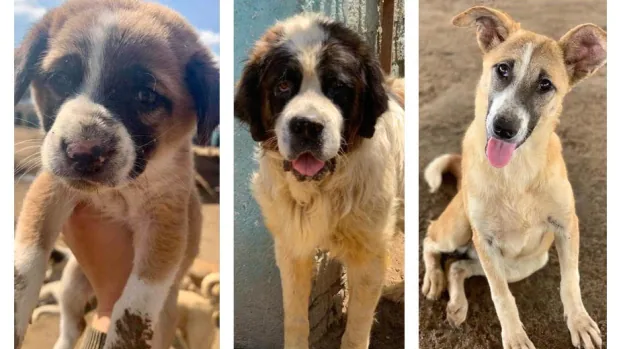Dog rescue organizations across Canada hope Ottawa will have a change of heart over its ban on street dogs from more than 100 countries.
In June, the Canadian Food Inspection Agency (CFIA) announced that commercial dogs — dogs intended for resale, adoption, fostering, breeding, exhibition and research — at high risk for rabies will be banned from entering Canada starting Wednesday (Sept. 28), regardless of when import permits were issued.
“It’s very disheartening,” said Baladi Dog Rescue of Ontario co-founder Lindy Lystar. The London, Ont., group has been working with a rescuer in Cairo and has flown some 30 dogs to the region.
They’re a little bit scared, so they do need some extra care and love and training, but they’re great dogs.– Lindy Lystar, Baladi Dog Rescue of Ontario co-founder
“We have some very close friends in Egypt that are out there on the street every day and they see the horrors that these dogs have to go through,” said Lystar.
“She’ll come out of her house and there’s 10 or 20 dogs poisoned on the street, and she feels so helpless,” she said, referring to just one of the horrible ways street dogs seen are treated generally.
Most of the regions affected by the ban are in Africa (including Egypt), Central and South America, Asia, the Middle East and Eastern Europe.

“It doesn’t make a lot of sense,” said Lystar. The dogs are given vaccinations — including against rabies — their blood is tested for diseases, and they’re spayed or neutered before making the trip to Canada. There’s also a requirement that they need to be tested to assess a dog’s immunity to rabies before they leave Egypt.
“They’re a little bit scared, so they do need some extra care and love and training, but they’re great dogs,” said Lystar who has her own Egyptian dog, a short-haired, pointy-eared blond pet named Louise.
“They’re loyal dogs. They’re protective.They’re so intelligent.”
Animal rescuers are rushing to bring dogs into Canada before a ban on importing dogs from 113 countries considered high risk for rabies comes into effect.
Hopeful Canada reverses decision
CBC News reached out to CFIA and hadn’t received a response at time of publication. In July, the agency said Canada did not have any active cases of “dog rabies,” a strain different from the rabies typically found in wildlife such as skunks, foxes, raccoons and bats.
“I’m an animal lover, and it breaks your heart, and there’s so many of them,” said Fida Kablawi of London, Ont., who just returned with nine dogs from Egypt after a two-month stay in the capital city.

“It’s sad. It’s surprising, shocking sometimes,” she said. “There’s a lot of poverty. [People] have so many other problems to deal with that to them a suffering dog on the street is not a priority.”
Kablawi first visited Cairo in 2020 on a work trip, and was so taken by the city’s street dogs that she’s returned multiple times to fly dogs back with her. She works with Baladi Dog Rescue and through fundraising, pays for the dogs’ medical bills, the paperwork and the flights.
The dogs are only allowed to leave the country once Egypt’s Ministry of Agriculture checks them out and signs off on the paperwork, said Kablwai.

“Most of the ones that we pick have had a really rough time — they’ve been neglected or they’ve been tied to a roof and chained and starved,” she said. “The ones with the tough stories, the ones that we feel need the most love, the ones who have had it the worst, we try to bring over to give them a better life.
“I do believe Canada will change this [the ban] with just maybe some stricter laws when the dogs enter the country,” she said.
Rescuers have been calling for better regulations, including quarantining, vet checks and behavioural assessments, to ensure the safety of both the dogs and families who will home them.






















Discussion about this post